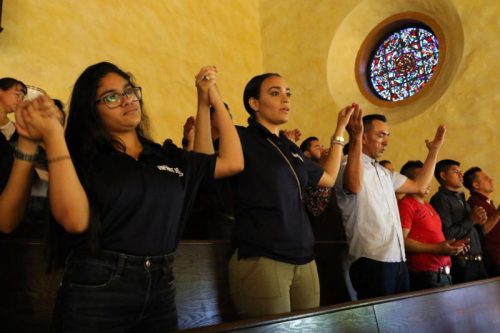The alarms went off — again — in October 2019 as the Pew Research Center reported on a recent survey indicating a fast and steady decline of people in the United States self-identifying as Christian.

The report, “In U.S., Decline of Christianity Continues at Rapid Pace,” available online, is worth reading if one wants to have a sense of how people in our country relate to religion. Fewer people in the U.S., especially among the young, self-identify as Christian.
The reactions have varied: shock, skepticism, nuanced readings, alternative readings, silence, etc. Whether one agrees or disagrees with the Pew Research Center’s methodology, its analysis of the data and conclusions, I commend the researchers for keeping the question of religion on the front burner. Religion shapes much of who we are as individuals and as a society.
It is tempting to look at statistics about religious affiliation as a zero-sum game: some win, some lose. In this particular report, Christian denominations appear as the big losers.
My preference is to allow room for the complexities associated with religious affiliation. The growing number of people in our country who self-identify with non-Christian faiths, about 7% compared to 5% 10 years ago, points more to our growing diversity as a society than to a battle for souls among religions and the forces of secularization.
Church attendance remains a standard marker of religious health and vibrancy among denominations in the United States. The report confirms a steady trend: Fewer adults in our country, particularly millennials (born between 1981 and 1996), go to church on a regular basis.
Although church attendance is key to building community and sustaining one’s religious identity, apart from other spiritual and theological reasons, one needs to inquire whether or not going to church is tantamount to not being Christian enough.
Millions of Catholics in the world do not have access to churches, services and clergy on a regular basis, yet they remain Catholic and live active Catholic lives in their families and neighborhoods.
Perhaps one of the most interesting findings of the recent report is the observation that less than half of Hispanics in our country self-identify as Catholic (about 47%). As far as memory goes, we have practically taken for granted the assumption that the majority of Hispanics are Catholic. No longer.
This should not be a surprise, however. Populations are not static. In a fast-paced culture, attitudes toward religion and churches change on a regular basis. How churches engage populations or fail to do so has consequences.

As the number of U.S.-born Hispanics increases (currently about 66%), the chances that Hispanics will self-identify as Catholic dwindle. Like their peers in other cultural communities, Hispanic millennials are less likely to be religiously affiliated. Despite growing up in Catholic households and partaking of expressions of cultural Catholicism, few self-identify as Catholic.
Does this mean that we should no longer engage Hispanic Catholics in our faith communities and evangelization efforts? Not at all! Besides being a defeatist attitude, such a position would only serve as a way to justify the still inadequate outreach and embrace of Hispanic Catholics in many corners of our faith communities, organizations and institutions.
The results of the Fifth National Encuentro of Hispanic/Latino Ministry (2018) revealed that there are about 30 million Hispanic Catholics living in the United States. Of these, approximately 13.5 million are immigrants and 16.6 million are U.S.-born. About half are younger than 30.
Yes, the percentage of Hispanics who self-identify as Catholic is declining, yet there are still 30 million ready to build church. It is time to engage them here and now before the alarms go off again.
Hosffman Ospino es profesor de teología y educación religiosa en Boston College.






















